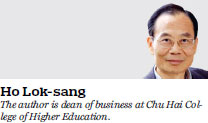Better way to gauge school performance
Updated: 2017-04-05 05:31
By Ho Lok-sang(HK Edition)
|
|||||||
Ho Lok-sang says as long as schools are under pressure to deliver, school assessments will put pressure on students to produce stellar results
The subject of the Territory-wide System Assessment (TSA), now redesigned and relabeled Basic Competencies Assessment (BCA), has continued to capture media attention and attracted much public debate. This past week the subject even engendered an unusual alliance across party boundaries in the Legislative Council, with 33 legislators from both the pro-establishment camp and the "pan-democrat" camp signing a petition to immediately halt the assessment at Primary 3 level.
Chief Executive-elect Carrie Lam Cheng Yuet-ngor had indicated she would halt the BCA. But her request to stop it this academic year was rejected by Chief Executive Leung Chun-ying, who preferred to retain it in his term of administration. Eddie Ng Hak-kim, the secretary for education, in answer to queries from legislators, explained that the BCA was an assessment of basic competencies and did not need any drilling. The test has also been redesigned and in general is much easier than the TSA. The Education Bureau (EDB) has also strongly advised against drilling for the BCA.
Yet the complaint lingers and this is due to the prevalent culture of penalizing weak performers; funding could be reduced when a department, university, program or a school is not up to par. There is a culture of "top-slicing" from universities, asking them to compete for funds derived, and this culture has been imitated within a university. The earlier "Teaching and Learning Process Review" had given way to "Outcome-based Teaching and Learning". So it is no longer adequate for universities to have good practices and good processes. Universities have to deliver. Schools have to deliver. Teachers have to deliver. Students have to deliver. Under such culture more and more stakeholders are wary of tests that would put the spotlight on weak performers. Lest the school be punished, pressure would be put on teachers, and then teachers would pass on the pressure to students. As long as the BCA gives the EDB statistics on how individual schools perform, principals of schools are unlikely to let up; teachers are unlikely to let up; and students will still be drilled to ensure the school makes the grade.

Given that this culture is already deeply ingrained in the thinking of both bureaucrats and educators, just telling them that the EDB will not use the BCA results to determine resource allocation will not be enough to pacify teachers, parents and students. Some arrangement has to be in place, so that all stakeholders can have peace of mind.
Various suggestions have been made. It was suggested that schools may opt out if they want. Alternatively, students may be allowed to opt out. But then the results would only reflect the performance of those that opt to take the assessment. From the EDB's perspective, this is not ideal. From the social point of view, having made the investment in schools, there is a need to assess whether the investment had borne fruit.
There is the suggestion of randomly picking students from all schools in Hong Kong. Since this is a random selection of students, results should reflect the performance of the "population"; that is, they can represent the performance of all students in Hong Kong, thus providing the EDB with a measure of the effectiveness of the education. But presumably the management of each school would like to know how it is doing. Thus information about school performance may be of interest to the schools "for developmental purposes."
Accordingly, it may be desirable to let a third party administer the assessment, so that the EDB will only have the aggregate results but will not have access to the results from any specific school. This third party can give a school information about its performance if the school wishes but will not disclose the information to anyone else. Both the Hong Kong Professional Teachers' Union and the Hong Kong Federation of Education Workers may be asked to oversee the administration of the assessment and to ensure the confidentiality of the information.
Under the proposed arrangement there should not be any perceived adverse consequences of underperformance on schools. Schools will then have no incentive to drill students excessively to obtain good results. Since there cannot be any perceived adverse consequence of underperformance on students either, the assessment will not increase pressures on students.
The fact that legislators from different camps could come together on an issue that affects Hong Kong's school children is a good sign. I hope this is the beginning of a legislature that is united in serving the interest of the Hong Kong public. If my proposal is a good one, will they come forward to recommend to the government? Is this not better than halting the BCA altogether?
(HK Edition 04/05/2017 page8)